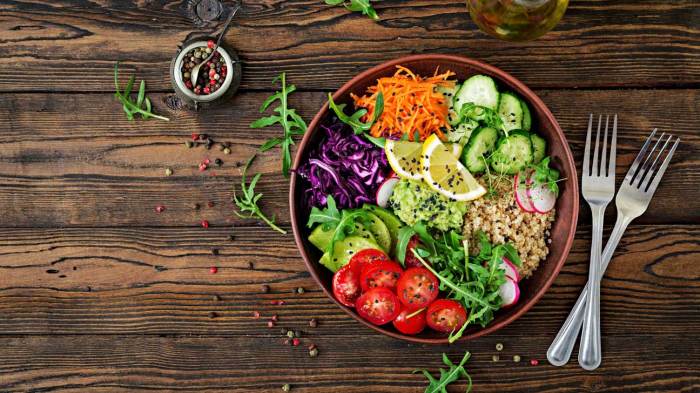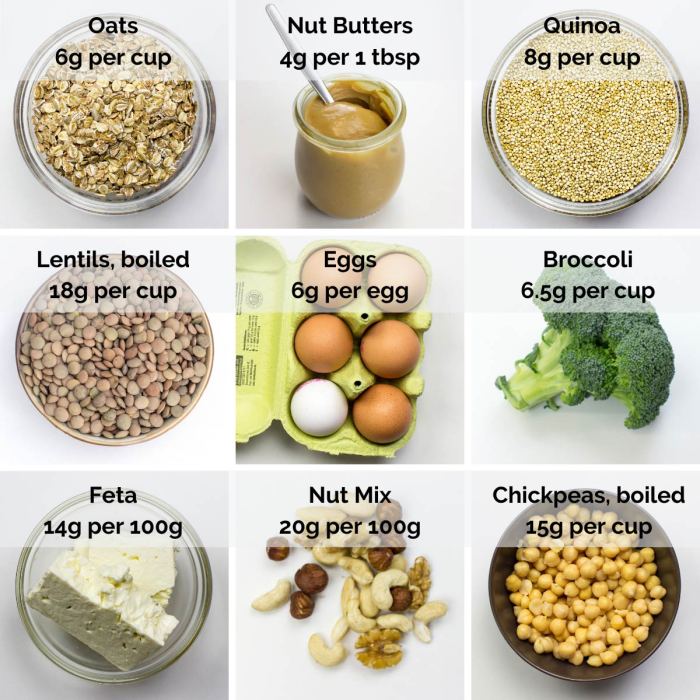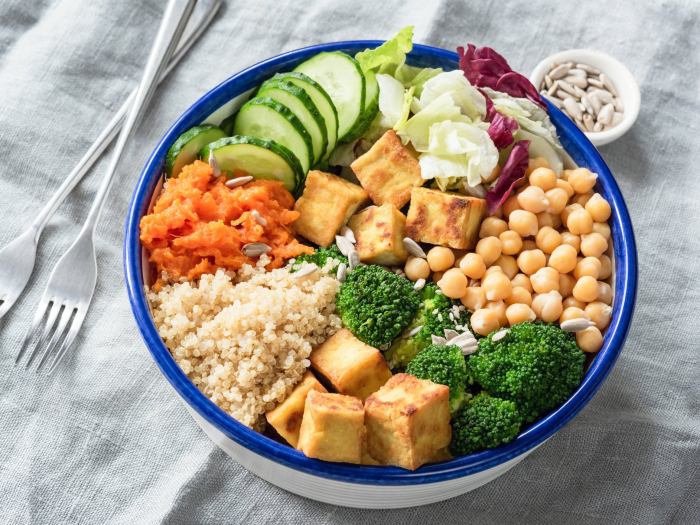Embark on a culinary journey with the Vegetarian Healthy Eating Plan, a comprehensive guide to unlocking the transformative power of plant-based nutrition. Discover the myriad benefits of a vegetarian diet, from enhanced well-being to a more sustainable lifestyle. Our experts unveil the secrets to ensuring nutritional adequacy, empowering you to embrace a vibrant and fulfilling vegetarian lifestyle.
Delve into the intricacies of vegetarian meal planning, with a sample plan that caters to your nutritional needs. Explore the diverse world of vegetarian food groups, each offering a symphony of health benefits. Indulge in our curated collection of delectable vegetarian recipes, designed to tantalize your taste buds while nourishing your body.
Introduction
Vegetarian healthy eating plans are dietary patterns that exclude meat, poultry, fish, and seafood. They emphasize plant-based foods such as fruits, vegetables, whole grains, legumes, and nuts. Vegetarian diets offer numerous health benefits and can be nutritionally adequate when planned carefully.
Adopting a vegetarian diet has been linked to reduced risks of chronic diseases such as heart disease, stroke, type 2 diabetes, and some types of cancer. Vegetarian diets are typically high in fiber, antioxidants, and phytochemicals, which have been shown to have protective effects against these diseases.
Adopting a pescetarian lifestyle offers numerous health benefits, from reducing the risk of heart disease to improving cognitive function. If you’re curious about how to make the switch, here’s a comprehensive guide that will help you navigate the transition seamlessly.
Nutritional Adequacy
Ensuring nutritional adequacy is crucial when following a vegetarian diet. Some nutrients, such as protein, iron, vitamin B12, and calcium, may be less readily available in plant-based foods. Vegetarians need to pay attention to their intake of these nutrients and consume fortified foods, supplements, or plant-based sources rich in these nutrients.
Essential Nutrients for Vegetarians
Vegetarians have unique nutritional needs compared to omnivores. Understanding and fulfilling these requirements is crucial for maintaining optimal health. This section delves into the specific nutrient requirements for vegetarians, providing a comprehensive guide to ensure a balanced and nutritious diet.
A vegetarian diet excludes meat, poultry, and fish, but it can still provide all the essential nutrients needed for good health. However, certain nutrients may require special attention to ensure adequate intake.
Key Nutrients and Vegetarian Food Sources
The following table summarizes the key nutrients that vegetarians need to pay attention to, along with their recommended daily intake and vegetarian food sources:
| Nutrient | Recommended Daily Intake | Vegetarian Food Sources |
|---|---|---|
| Protein | 0.8 grams per kilogram of body weight | Beans, lentils, tofu, tempeh, nuts, seeds |
| Iron | 18 mg for women, 8 mg for men | Leafy green vegetables, beans, lentils, fortified cereals |
| Calcium | 1,000 mg | Dairy products (for lacto-vegetarians), fortified plant milks, leafy green vegetables, tofu |
| Vitamin B12 | 2.4 mcg | Fortified plant milks, nutritional yeast, fortified cereals (for vegans) |
| Vitamin D | 600 IU | Sunlight, fortified plant milks, fatty fish (for pescatarians) |
| Omega-3 Fatty Acids | 1.1 grams for women, 1.6 grams for men | Flaxseed, chia seeds, walnuts, algae oil (for vegans) |
Supplementation
While a well-planned vegetarian diet can provide all the essential nutrients, certain nutrients may require supplementation. Vitamin B12, for example, is primarily found in animal products, so vegetarians and vegans may need to supplement to ensure adequate intake. Other nutrients that may need supplementation include iron, calcium, and vitamin D, depending on individual needs and dietary choices.
Planning a Vegetarian Meal Plan: Vegetarian Healthy Eating Plan
Creating a well-rounded vegetarian meal plan is essential for meeting nutritional needs while adhering to a plant-based diet. Vegetarian meal planning involves balancing a variety of food groups to ensure adequate intake of protein, vitamins, minerals, and other essential nutrients.
Variety and Balance
Variety and balance are key principles in vegetarian meal planning. Aim for a diverse range of fruits, vegetables, whole grains, legumes, nuts, and seeds throughout the day. Include all food groups in each meal to cover the spectrum of essential nutrients.
Vegetarian Food Groups

A balanced vegetarian diet should include a variety of foods from all food groups to ensure adequate intake of essential nutrients. Vegetarian food groups provide a range of health benefits, including reduced risk of chronic diseases, improved digestion, and weight management.
The following table categorizes vegetarian food groups and highlights their specific health benefits:
Fruits
- Rich in vitamins, minerals, and antioxidants
- Support immune function, heart health, and digestion
- Examples: berries, apples, bananas, oranges
Vegetables
- Excellent source of vitamins, minerals, and fiber
- Promote healthy digestion, reduce inflammation, and protect against chronic diseases
- Examples: leafy greens, broccoli, carrots, sweet potatoes
Whole Grains
- Provide complex carbohydrates, fiber, and B vitamins
- Support digestive health, regulate blood sugar levels, and reduce the risk of heart disease
- Examples: brown rice, quinoa, oats, whole-wheat bread
Legumes
- Rich in protein, fiber, and iron
- Support muscle growth, reduce cholesterol levels, and promote blood sugar control
- Examples: beans, lentils, peas, tofu
Dairy or Plant-Based Alternatives
- Provide calcium, protein, and vitamin D
- Support bone health, muscle function, and immune function
- Examples: milk, yogurt, cheese; fortified plant-based milk, yogurt, cheese
Vegetarian Recipes

Incorporate delectable and nutritious vegetarian dishes into your diet with our comprehensive recipe collection. Organized into convenient categories, each recipe offers a harmonious blend of flavors, wholesome ingredients, and essential nutrients, empowering you to savor every bite while nourishing your body.
Our vegetarian culinary creations are meticulously crafted to provide a balanced intake of protein, carbohydrates, vitamins, and minerals. With detailed step-by-step instructions, ingredient lists, and nutritional information, you can confidently prepare these dishes at home, ensuring a healthy and satisfying culinary experience.
Embarking on a pescetarian lifestyle can be a rewarding journey, but it’s essential to approach it with a well-informed plan. Fortunately, there are countless resources available to guide you through the transition. From meal planning to finding the right substitutes, a comprehensive guide like this one can provide invaluable insights and support as you navigate this dietary shift.
Breakfast
Kickstart your day with an invigorating vegetarian breakfast that fuels your body and tantalizes your taste buds. From hearty grain bowls to fluffy pancakes, our breakfast recipes offer a symphony of flavors and textures, ensuring a nutritious and satisfying start to your day.
- Quinoa Breakfast Bowl with Berries and Nuts:A vibrant and protein-packed bowl featuring fluffy quinoa, sweet berries, crunchy nuts, and a drizzle of creamy nut butter.
- Vegan Chickpea Scramble:A savory and protein-rich scramble made with chickpeas, tofu, and a blend of aromatic spices, perfect for a satisfying morning meal.
- Whole-Wheat Banana Pancakes:Light and fluffy pancakes crafted with whole-wheat flour, ripe bananas, and a touch of cinnamon, providing a sweet and wholesome start to your day.
Lunch
Enjoy a flavorful and nutritious vegetarian lunch that keeps you energized throughout the afternoon. Our lunch recipes are designed to be portable, satisfying, and packed with essential nutrients, making them ideal for busy weekdays or leisurely weekends.
- Mediterranean Chickpea Salad:A refreshing and protein-packed salad featuring chickpeas, fresh vegetables, feta cheese, and a tangy lemon-herb dressing.
- Lentil Soup with Roasted Vegetables:A hearty and comforting soup made with lentils, roasted vegetables, and a flavorful vegetable broth, providing a warm and nourishing meal.
- Vegetarian Sushi Bowl:A vibrant and customizable bowl featuring sushi rice, avocado, cucumber, carrots, and a drizzle of soy sauce, offering a satisfying and refreshing lunch option.
Dinner, Vegetarian healthy eating plan
Indulge in a delectable and nourishing vegetarian dinner that satisfies your cravings and promotes well-being. Our dinner recipes are a symphony of flavors and textures, featuring an array of fresh vegetables, whole grains, and plant-based proteins.
- Vegetable Stir-Fry with Brown Rice:A colorful and flavorful stir-fry featuring a variety of vegetables, tofu, and a savory sauce, served over fluffy brown rice.
- Vegan Shepherd’s Pie:A comforting and hearty dish made with a lentil and vegetable filling topped with a creamy mashed potato crust, providing a satisfying and wholesome meal.
- Roasted Butternut Squash with Quinoa and Pomegranate:A vibrant and nutrient-rich dish featuring roasted butternut squash, fluffy quinoa, and sweet pomegranate seeds, offering a delightful combination of flavors and textures.
Snacks
Satisfy your cravings between meals with healthy and nutritious vegetarian snacks. Our snack recipes are quick and easy to prepare, providing a boost of energy and essential nutrients to keep you going throughout the day.
- Fruit and Nut Butter:A simple and satisfying snack featuring fresh fruit slices paired with creamy nut butter, providing a balanced combination of sweetness and protein.
- Homemade Granola Bars:Crunchy and flavorful granola bars made with oats, nuts, seeds, and a touch of honey, offering a portable and energizing snack.
- Vegetable Sticks with Hummus:A refreshing and nutrient-rich snack featuring crisp vegetable sticks paired with creamy hummus, providing a satisfying and healthy crunch.
Desserts
Treat yourself to a guilt-free and delectable vegetarian dessert that satisfies your sweet tooth without compromising your health goals. Our dessert recipes are crafted with wholesome ingredients and natural sweeteners, providing a sweet and satisfying end to your meal.
- Vegan Chocolate Avocado Pudding:A rich and creamy pudding made with ripe avocados, cocoa powder, and a touch of maple syrup, offering a decadent and healthy dessert option.
- Baked Apples with Cinnamon and Honey:Warm and comforting baked apples filled with a sweet and aromatic mixture of cinnamon and honey, providing a cozy and satisfying dessert.
- Fruit Sorbet:A refreshing and light sorbet made with fresh fruit, blended until smooth and frozen, offering a guilt-free and flavorful dessert option.
Tips for Eating Out as a Vegetarian
Navigating the restaurant scene as a vegetarian can be a challenge, especially in areas with limited vegetarian-friendly options. However, with some preparation and research, you can find delicious and satisfying vegetarian meals while dining out.
- Research Restaurants:Before venturing out, research restaurants in your area that offer vegetarian options. Check online reviews and websites to see if they have a separate vegetarian menu or if they can accommodate vegetarian requests.
- Call Ahead:If you have specific dietary needs or concerns, don’t hesitate to call the restaurant ahead of time.
Explain your dietary restrictions and inquire about their vegetarian options. This way, you can avoid any surprises or disappointments when you arrive.
- Ask for Recommendations:Once you’re at the restaurant, don’t be afraid to ask your server for recommendations. They may be aware of hidden vegetarian dishes or can suggest modifications to existing dishes to make them vegetarian-friendly.
- Be Clear About Your Needs:When ordering, be clear and specific about your dietary needs. Avoid using vague terms like “no meat” or “vegan.” Instead, state that you’re a vegetarian and specify any allergies or restrictions you may have.
- Be Open to Modifications:Many restaurants are willing to modify dishes to accommodate vegetarian requests.
Don’t hesitate to ask if they can remove meat from a dish or substitute vegetarian ingredients.
- Explore Ethnic Cuisines:Ethnic cuisines often have a wider variety of vegetarian options than traditional American fare. Indian, Thai, Ethiopian, and Mexican restaurants are good places to start your search for vegetarian-friendly meals.
By following these tips, you can increase your chances of finding satisfying vegetarian meals while dining out. With a little preparation and communication, you can enjoy a delicious and diverse vegetarian dining experience.
Vegetarianism and Sustainability
Vegetarianism offers significant environmental benefits, contributing to a more sustainable food system. Meat production poses challenges to our planet, emitting greenhouse gases, consuming vast amounts of water, and requiring extensive land use.
Greenhouse Gas Emissions
Animal agriculture is a major contributor to greenhouse gas emissions, particularly methane and nitrous oxide. Methane is released during digestion in livestock, while nitrous oxide is emitted from manure and synthetic fertilizers used in feed production. These gases trap heat in the atmosphere, contributing to climate change.
Water Consumption
Meat production requires substantial water resources. Raising cattle, for example, consumes approximately 20 times more water than growing plant-based foods. This water scarcity can impact water availability for human consumption, irrigation, and ecosystems.
Land Use
Animal agriculture occupies vast amounts of land, often converted from natural habitats. Deforestation and habitat loss contribute to biodiversity loss, soil erosion, and climate change. Vegetarianism reduces the demand for meat, freeing up land for reforestation, conservation, and sustainable agriculture.
Examples of Sustainable Vegetarianism
* Plant-Based Diets:Adopting plant-based diets reduces the environmental impact associated with meat production.
Local and Seasonal Produce
Consuming locally sourced and seasonal produce minimizes transportation emissions and supports sustainable farming practices.
Reducing Food Waste
Vegetarian diets tend to generate less food waste than meat-based diets, as plant-based foods have longer shelf lives.
Support for Sustainable Agriculture
Choosing vegetarian products from farmers who prioritize environmental practices promotes sustainable food systems.
Final Thoughts

As you embrace the Vegetarian Healthy Eating Plan, you embark on a path of culinary exploration and personal transformation. Remember, a vegetarian lifestyle is not merely a dietary choice; it’s a celebration of health, sustainability, and the boundless joy of plant-based living.
Let this guide be your compass as you navigate the world of vegetarianism, unlocking a world of flavor, nourishment, and well-being.
Key Questions Answered
What are the key benefits of adopting a vegetarian diet?
A vegetarian diet offers numerous benefits, including reduced risk of chronic diseases such as heart disease, stroke, type 2 diabetes, and certain types of cancer. It promotes weight management, improves digestion, and boosts energy levels.
How do I ensure I’m getting all the essential nutrients on a vegetarian diet?
Planning a balanced vegetarian diet is crucial to ensure adequate intake of protein, iron, calcium, vitamin B12, and other essential nutrients. Include a variety of fruits, vegetables, whole grains, legumes, nuts, and seeds in your meals. Consider consulting a registered dietitian for personalized guidance.
Can I still enjoy delicious and satisfying meals as a vegetarian?
Absolutely! Vegetarian cuisine is incredibly diverse and flavorful. With countless vegetarian recipes available, you can explore a wide range of culinary traditions and create mouthwatering dishes that will delight your taste buds and nourish your body.